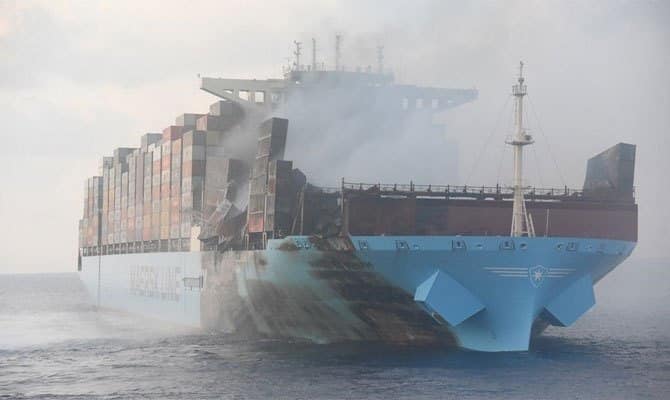Excess, unidentified baggage in containers is breaking the back of shipowners
Urgent Measures Needed to Combat Cargo Misdeclaration

Recent insights from Captains Naveen Singhal and M.M. Saggi highlight the growing issue of misdeclared cargoes in the shipping industry. While containerization has revolutionized cargo transport, the practice of falsifying container weights and contents poses significant risks to safety and efficiency. Major shipping accidents in the past decade, driven by this issue, underscore the urgent need for reform.
The Impact of Misdeclared Cargoes
In recent years, numerous container ship accidents, including the MSC Flaminia in 2012 and the Maersk Honam in 2018, have been linked to misdeclared cargoes. According to Lloyd’s Register, these misdeclarations are the third leading cause of containership accidents. When shippers under-declare the weight of a container, it can lead to severe stability issues. For instance, if a container weighing 18 tons is declared as only eight tons, it creates a dangerously top-heavy situation. This makes the vessel more susceptible to excessive rolling, placing undue stress on container stacks and lashings. Such conditions can ultimately result in containers breaking loose and falling overboard.
Furthermore, the improper stowage of hazardous materials can lead to catastrophic incidents. For example, placing an exothermic cargo next to a flammable liquid may initially seem safe, but the motion of the ship can trigger thermal runaway or combustion, resulting in fires or explosions. Unfortunately, ships are often ill-equipped to handle such emergencies, and crew members lack the necessary training for these extraordinary chemical disasters.
Despite a mandatory requirement for verified gross mass (VGM) implemented by the International Maritime Organization (IMO) in July 2016, many shippers and freight forwarders continue to disregard this regulation. This negligence places a heavy burden on shipowners, who bear the consequences of others’ actions. International customs authorities, bound by existing conventions, rely on the declarations made by shippers and freight forwarders, creating a significant vulnerability in the supply chain.
Proposed Solutions for Safer Shipping
To tackle the issue of misdeclared cargoes, experts propose several critical measures. First, an independent body, such as a classification society, should be appointed to verify the contents, weight, packaging, and lashing of containers at the stuffing stage. This verification process should be a prerequisite for customs to issue cargo manifests. Additionally, it is vital for all shippers and freight forwarders to obtain a unique IMO number, which should be included in shipping bills and customs manifests for every container.
Training requirements similar to those mandated by the International Civil Aviation Organization for handling IMDG cargo should also be established for maritime shippers and freight forwarders. Misdeclaration should be treated as a cognizable offense, with significant penalties enforced by member states of the IMO. This would serve as a deterrent against the practice and enhance accountability across the industry.
The World Customs Council and the IMO should convene a joint session to address this pressing issue and explore solutions to alleviate the burden on containership owners. As the shipping industry continues to evolve, the implementation of these measures is essential to ensure safety and efficiency in global trade.
